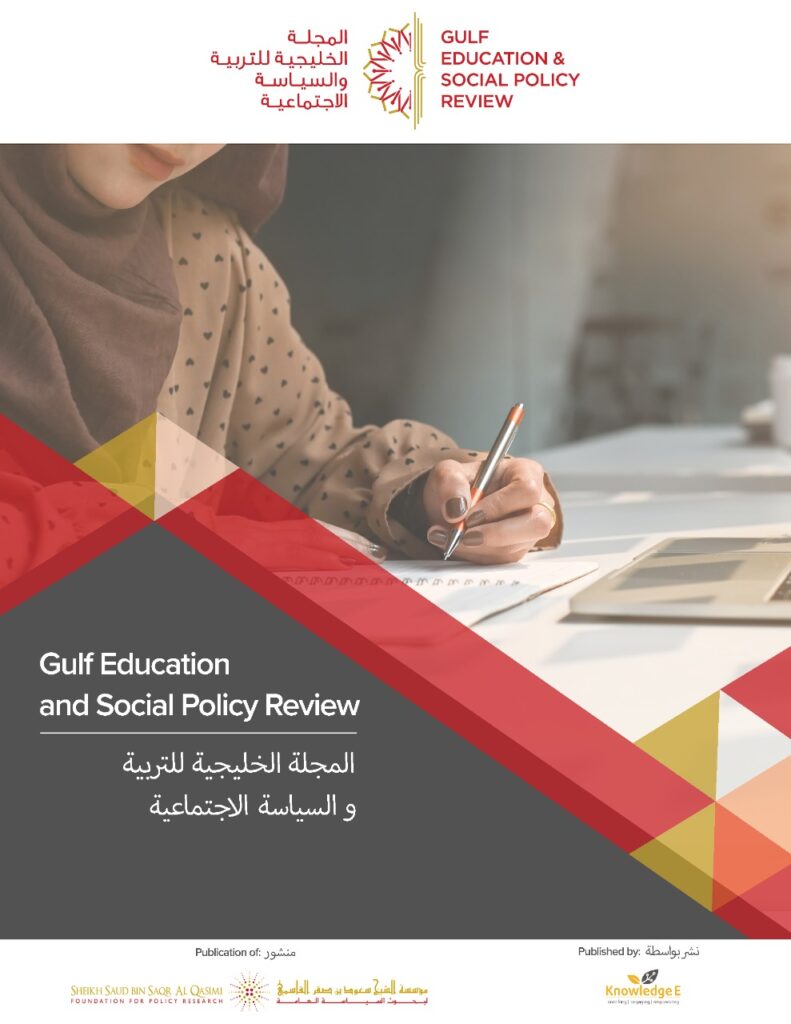
Gulf Education and Social Policy Review
ISSN: 2709-0191
Pioneering research on education and social policy in the Gulf region.
The Family Dialogue Culture and Its Obstacles in the Omani Family from the Viewpoint of Teachers in North Eastern Province, Sultanate of Oman
Published date:Jul 29 2020
Journal Title: Gulf Education and Social Policy Review
Issue title: Gulf Education and Social Policy Review (GESPR): Volume 1, Issue 1
Pages:22 – 52
Authors:
Abstract:
This quantitative study investigates the level of the culture of dialogue within the Omani family and its hindrances from teachers’ perspectives in Ash Sharqiya North Governorate in the Sultanate of Oman. Out of 4516 teachers in the governorate in the academic year 2018-2019, 96 teachers participated in the study. The study used a survey, which included two sections; one assessed the level of the culture of dialogue and the second assessed obstacles of family dialogue. The study revealed that, based on the teachers’ perspectives, there was a high level of the culture of dialogue in the Omani family. The level of the obstacles of the family dialogue was low. The major obstacles were family dependency on housemaids, other employees at home, and parents being busy. Further, the study indicated that there were no statistically significant differences at the level of (0.05) in the areas of the culture of dialogue on gender, level of education, social status, and the number of family members. However, a statistically significant difference exists at the level of the culture of dialogue at the gender factor in favor of male teachers. There were no statistically significant differences at the level of (0.05) at the hindrances of the culture of dialogue based on gender, level of education, social status, and the number of family members. The main recommendations were: a) activating the culture of dialogue within educational institutions such as schools, b) the importance of parents’ awareness of characteristics of children’s development stages c) conducting workshops and seminars for parents and d) enhancing the media role for the importance and advantages of the culture of dialogue.
Keywords: The Culture of Dialogue, Dialogue Level, Family Dialogue, Omani Family
References:
[1] إحسان محمد الحسن (1988). مدخل إلى علم الاجتماع: دار النشر والطباعة، بيروت .
[2] السليمي، إيناس أحمد علي (2019). الحوار الأسري وعلاقته بتعزيز القيم الاجتماعية لدى الأبناء. مجلة القراءة والمعرفة، جامعة عين شمين كلية التربية، الجمعية المصرية للقراءة والمعرفة، ع(215)،سبتمبر2019، ص ص 271-318.
[3] الشامي، محمود محمد صالح (2014). مستوى ثقافة الحوار لدى الأسرة الفلسطينية في محافظة رفح - دراسة ميدانية على عينة من الآباء والأبناء-، مجلة العلوم الاجتماعية، العدد (182)، 19 ديسمبر 2014.
[4] الشيخلي، محمد (1993). الحوار الأسري: دار ابن حزم للنشر، لبنان، بيروت.
[5] الظفري، سعيد (2017). أنماط التنشئة الوالدية السائدة في الأسرة العمانية. المؤتمر الدولي السابع بكلية العلوم الاجتماعية “تحديات التنمية: رؤية مستقبلية ". جامعة الكويت. الكويت. . https://www.trc.gov.om/trcweb/ar/topics/media/news/6618
[6] كتاب أعمال المؤتمر الدولي المحكم:(2018). التفكك الأسري: الأسباب والحلول. طرابلس، لبنان، مركز جيل البحث العلمي سلسلة كتاب أعمال المؤتمر، ص ص 190-193.
[7] كريمة، كروش (2011). الحوار بين الآباء والأبناء، رسالة ماجستير غير منشورة في تخصص إرشاد وتوجيه، جامعة وهران السانيا، كلية العلوم الاجتماعية، الجزائر.
[8] مركز الملك عبد العزيز للحوار الوطني (2011). واقع الحوار الأسري داخل المجتمع السعودي، المملكة العربية السعودية: إدارة الدراسات والبحوث للنشر.
[9] المعمري، وفاء سعيد (2015). الأسباب المؤدية للطلاق من وجهة نظر المطلقين والمطلقات في المجتمع العماني، مجلة أماراباك، الأكاديمية الأمريكية العربية للعلوم والتكنولوجيا، مج (6)، ع(19)، ص ص 1-26.
[10] المنجرة، المهدي (2005). حوار التواصل من أجل مجتمع معرفي: مطبعة النجاح الجديدة، الدار البيضاء.
[11] منصور، عبد الملك (2002). مكانة الحوار الثقافي ودوره في بناء الحضارة الإنسانية المشتركة، في الحوار الثقافي العربي الأيبرو أمريكي: الإسهامات المشتركة والتأثير المتبادل، المنظمة العربية للتربية والثقافة والعلوم، تونس، 10-12/12/2002، ص ص 37-50.
[12] المنظمة الإسلامية للتربية والعلوم والثقافة (2002)، الكتاب الأبيض حول الحوار بين الحضارات، المملكة المغربية.
[13] المنظمة العربية للتربية والثقافة والعلوم(الإيلسكو).(2019). تعزيز ثقافة التعايش والحوار البناء ومكافحة التطرف والعنف. https://2u.pw/Q3Kig
[14] الميزر، هند بنت عقيل (2017). دور الأسرة في تعزيز ثقافة الحوار. الفكر الشرطي، القيادة العامة لشرطة الشارقة، مركز بحوث الشرطة، مج(26)،ع(100)، ص ص 259-295.
[15] نحو ثقافة الحوار بين الأديان (2017). كتاب مؤتمر نحو ثقافة الحوار بين لأديان، جامعة المعارف، بيروت، لبنان، 12 و 13 أيلول/ سبتمبر 2017م، ص ص 328-329.
[16] الهاجري، تهاني منقاش؛ الرشيدي، غازي عنيزان؛ العبد الغفور، محمد (2015). واقع الحوار الأسري بين الوالدين والأبناء في دولة الكويت، مجلة كلية التربية بالزقازيق (دراسات تربوية ونفسية)، العدد (89)، الجزء (1) أكتوبر 2015، ص ص 1- 30.
[17] الهاشمي/ مبارك (2006)، أصول ثقافة الحوار وضوابطه في الفكر العربي والإسلامي، بحث مقدم إلى الندوة الدولية حول حوار الحضارات والثقافات، سلطنة عمان، 12-15/8/2006.
[18] الوايلي، حصة بين عبد الرحمن (2010). الحوار الأسري التحديات والمعوقات دراسة وصفية تحليلية: مكتبة الملك فهد الوطنية، مركز الملك عبد العزيز للحوار الوطني، الرياض، ط3.
[19] Yamane, Taro. (1967): Statistics: An Introductory Analysis, 2nd Ed., New York: Harper and Row.
[20] Singh AS, MB Masuku (2014): Sampling Techniques& Determination of Sample Size Applied Statistics Research: An Overview, International Journal of Economics, Commerce and Management, Vol. II, Issue 11, Nov 2014, United Kingdom: http://ijecm.co.uk/
[21] Keown, Louise. Palmer, Melanie. (2014). Comparisons between paternal and maternal involvement with sons: early to middle childhood. Early Child Development and Care, 184(1), 99-117.
[22] Jenkins ،P. School Delinquency and School Commitment, Sociology of Education, 68,221-239, 1995, p7.
[23] Glenn D. (2003). Determining Sample Size. IFAS EXTENSION (PEOD6(. University of Florida.P.3.
[24] Xu, Qi. (2011, May). The Family Dialogue: Language Acculturation and its Impact on Perceived Family Conflict among Asian Americans. Bard College, New York.